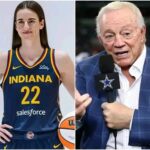
The news stunned the basketball world: Cheryl Swoopes, four-time WNBA champion and Hall of Famer, has been removed from all WNBA TV broadcasts for the 2025 season.
It wasn’t just one comment. It was the culmination of a year-long storm—a growing tension between the league’s rising star, Caitlin Clark, and one of its most vocal legends.
And now, even Steph Curry has entered the conversation, with a subtle but unmistakable reaction that has everyone talking.
A Year of Controversy
It began quietly: podcast appearances, interviews, and analysis segments where Swoopes repeatedly questioned Clark’s achievements, tone, and role in growing the game.
But it quickly became something else.
From dismissing Clark’s record-breaking season to falsely claiming she averaged 40 shots per game, Swoopes’ commentary moved beyond criticism and into what fans now call outright hostility.
“She’s not going to do in the WNBA what she did in college,” Swoopes said bluntly.
“So is it really a record? I don’t know. She had an extra year.”
These weren’t just harsh takes—they were factually questionable, and, to many, deliberately antagonistic.
A Pattern of Behavior
This wasn’t the first time Swoopes faced professional consequences.
Back in 2016, she was fired as head coach of Loyola University after a mass player exodus and allegations of toxic culture. Reports included players being belittled, threatened with lost scholarships, and emotionally manipulated.
Now, some are drawing parallels between that episode and her more recent broadcasting downfall.
“The drama always seems to follow her,” said one former colleague anonymously.
“There’s a difference between being honest and being hostile.”
The Caitlin Clark Effect
At the center of it all is Caitlin Clark, who has become a national phenomenon.
She shattered scoring records, led the NCAA in assists, and transformed the Indiana Fever into the most-watched WNBA franchise overnight.
Her presence has brought a flood of new fans, corporate sponsors, and visibility the league has never seen.
But not everyone has welcomed that change.
While Clark has taken the high road—rarely addressing personal criticism—others, including NBA superstar Steph Curry, have made their positions known.
When asked recently about Clark’s growth and Swoopes’ comments, Curry didn’t launch into a defense.
He just smiled and said:
“She’s changing the game. And you can’t fight momentum.”
A League Divided
The split in opinion has revealed something deeper.
For years, the WNBA was shaped by a tight-knit circle of former players, reporters, and influencers.
But Caitlin Clark’s rise disrupted that. New fans, new media voices, and YouTubers began to dominate the conversation.
Some veterans, like Swoopes, struggled to adjust.
That discomfort played out in real time on air—where, as fans pointed out, Swoopes would often go entire broadcasts without saying Clark’s name, even while praising her teammates.
The omission became a meme. And eventually, a liability.
Nancy Lieberman Steps In
One of the most telling developments came when Nancy Lieberman, another WNBA pioneer, called out Swoopes directly.
According to sources, Lieberman reached out privately to express concern over Swoopes’ tone and factual errors.
The conversation didn’t go well.
Weeks later, Lieberman was announced as Swoopes’ replacement on Dallas Wings broadcasts.
The message was clear: the league was moving on.
ESPN and National Backlash
Things escalated further when Stephen A. Smith, one of ESPN’s most powerful voices, criticized Swoopes on air.
“You know basketball,” he said. “There’s no way you just ‘forgot’ to mention Caitlin Clark.”
His tone was sharp. His implication—unavoidable.
The wave turned. Fast.
Fans flooded social media with clips, calling out what they saw as bitterness.
Meanwhile, Clark stayed silent, focusing on her game—and winning over more fans with every assist and logo three-pointer.
Where Does This Leave Swoopes?
Officially, the WNBA has not issued a detailed statement. But multiple broadcast partners have confirmed that Swoopes is “not part of the 2025 rotation.”
She hasn’t commented directly.
Insiders say she’s stunned—and unsure of her next move.
But for many fans, the writing was on the wall.
“You can disagree,” one fan tweeted, “but when you build your brand around tearing down the one person growing the league? Don’t be surprised when it turns on you.”
What It Means for the WNBA
The Swoopes saga is about more than one legend losing a job.
It’s about a generational shift.
The WNBA is growing—faster than anyone imagined.
And with that growth comes new expectations, new accountability, and a demand for voices that build the game, not gatekeep it.
Clark represents that future.
And Curry’s subtle nod to her success—just a sentence and a smile—might be the most powerful endorsement of all.
Because in 2025, it’s not about who used to run women’s basketball.
It’s about who’s running with it now.




